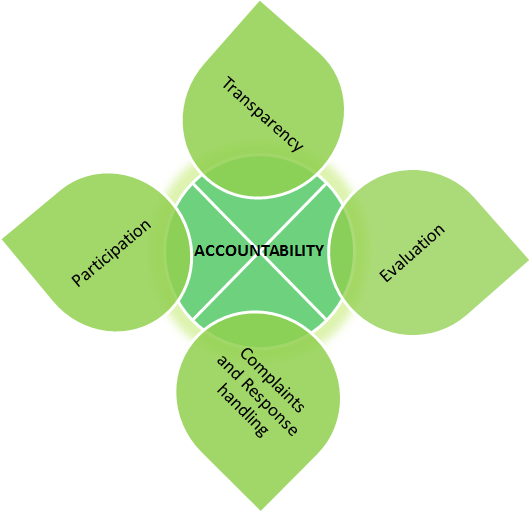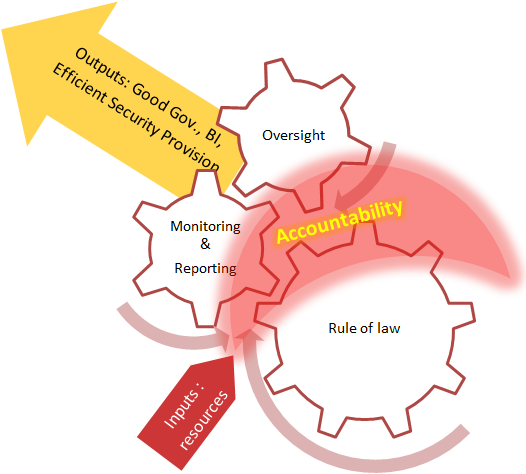According to CIDS, accountability means that people will be held responsible for their actions and for how they perform their duties. Accountability involves having control and verification systems in place, and, if necessary, the ability to arrest, prosecute and convict offenders for illegal, or corrupt behaviour. All personnel must be held accountable under the law regardless of rank, status or office.[1]
What is accountability?
Mark Bovens distinguishes between two concepts of accountability: accountability as a virtue and accountability as a mechanism. Accountability as a virtue refers to a set of standards for the evaluation of the behaviour of public actors. Accountability as a mechanism refers to an institutional relation in which an actor can be held to account by a forum.[2]
The Global Accountability Framework identifies four core dimensions that make an organisation more accountable to its stakeholders: transparency; participation (active engagement of both internal and external stakeholders in the decisions and activities that affect them); evaluation (monitoring and reviewing); and complaints and response handling.[3]
Accountability is a crucial element of Building Integrity (BI) initiatives and one of the key principles of Good Governance. A responsible, responsive, and democratic security sector cannot be conceived without accountable personnel, institutions, and procedures. Accountability, much like oil in machinery, ensures a smooth functioning of the system. It is understood, of course, that such a system exists. This system should include a set of independent and effective judiciary institutions; prosecution and sanction mechanisms; reporting, monitoring, and oversight schemes, along with a strong and active civil society.
Why is it important?
Accountability goes hand-in-hand with transparency as the inseparable elements of good security sector governance. Accountability as a virtue provides legitimacy to officials and organisations. Accountability as a mechanism is crucial for preventing corruption and ensuring good governance. Transparency and accountability via legal and administrative channels, such as courts, forums, auditors, ombudsmen, inspectors, and controllers also provide for checks and balances.[4]
How does it work?
Decision-makers in the government, security sector, private sector, and civil society organisations are all accountable to the public, as well as to institutional stakeholders.[5] Accountability can take several different shapes: in the form of information accessible to the public, auditing and monitoring committees, and inspectors; consultations through parliamentarians and other representatives of the public during the decision-making process; direct sanctions as a consequence of certain decisions, such as penalties, fines, prosecution, etc.; and indirect consequences due to certain actions, such as lesser budget assignation, leadership and human resources, restructuration, negative public perception and deterioration of defence and security sector professionals’ reputation.
Who is involved in accountability?
Accountability applies to all levels of the Defence and Security sector organisations. Leadership, military, and civilian personnel are all accountable for their actions before the government, law and justice, competent auditing/monitoring institutions and above all, the public. They ought to provide access to information relevant to their monitoring and control, as well as report their activities in a transparent and consistent manner to the authorities. They must submit to relevant trials and the resulting sanctions and penalties.
Resources
Bovens Mark (2010), “Two Concepts of Accountability: accountability as a virtue and as a mechanism”. West European Politics, 33:5, pp 946-967. Available here.
Bonn International Center for Conversion (BICC) (2002), Voice and accountability in the security sector. Paper 21.
Born Hans, Wills Aidan, DCAF-Ministry of Foreign Affairs of the Netherlands (2012), Overseeing Intelligence Services: a Toolkit.
Centre for Integrity in the Defence Sector (2015) Criteria for good governance in the defence sector. International standards and principles (2015)
Centre for Integrity in the Defence Sector: Guides to Good Governance
Centre for Integrity in the Defence Sector. Integrity Action Plan. A handbook for practitioners in defence establishments (2014).
DCAF (2015) International Standards of Financial Oversight in the Security Sector. 7.2 Toolkit- Legislating for the Security Sector.
DCAF (2008), National Security Policy Backgrounder. New edition available here.
DCAF (2009), Defence Reform. Backgrounder. New edition available here.
DCAF (2009), Police Reform. Backgrounder. New edition available here.
DCAF (2009), Security Sector Governance and Reform Backgrounder. New edition available here.
DCAF (2009), Security Sector Reform and Intergovernmental Organisations. Backgrounder. New edition available here.
DCAF (2006) Parliament’s role in Defence Procurement. DCAF Backgrounder. New edition available here.
DCAF (2006) Parliament’s role in Defence Budgeting. DCAF Backgrounder. New edition available here.
DCAF (2006) Parliamentary Oversight of Intelligence Services. DCAF Backgrounder. New edition available here.
DCAF (2006) Parliamentary Committees on Defence and Security. DCAF Backgrounder. New edition available here.
DCAF (2015), Parliamentary Brief: Building Integrity in Defence.
DCAF – UNDP (2008) Public Oversight of the Security Sector. A Handbook for Civil Society Organizations.
DCAF (2009), Defence Management: an Introduction. Security and Defence Management Series No. 1.
Ivanov Tilcho, «Transparency of Defence Policy in Progress», Information and Security. An International Journal. Vol. 11, 2003. pp 55-72.
NATO-DCAF, (2010). Building Integrity and Reducing Corruption in Defence. A Compendium of Best Practices.
NATO (2012) Building Integrity Programme
Nicolas Masson, Lena Andersson, Mohammed Slah Aldin, DCAF (2013) Strengthening Financial Oversight in the Security Sector.
OECD (2002) Best Practices for Budget Transparency
OSCE Code of Conduct on Politico- Military Aspects of Security
Transparency International (2013) Watchdogs? The quality of legislative oversight of defence in 82 countries. Government Defence and-corruption index.
Transparency and Accountability Initiative.
Transparency International. International Defence and Security Programme.
The World Bank (1988), Public Expenditure Management Handbook.
Transparency International (2012). Building Integrity and Countering Corruption In Defence and Security. 20 Practical Reforms.
Transparency and Accountability Initiative.
Transparency International. International Defence and Security Programme.
United Nations SSR task force, Security Sector Reform Integrated Technical Guidance Notes. 2012.
UN Instrument for Standardized International Reporting of Military Expenditures.
[1] Source: CIDS (2015), Integrity Action Plan: a handbook for practitioners in defence establishments. p 8.
[2] Bovens Mark (2010), “Two Concepts of Accountability: accountability as a virtue and as a mechanism”. West European Politics, 33:5, pp 946-967. Available here.
[3] Ibid. p 959.
[4] Ibid. p 955.
[5] Valeri Ratchev, «Governance, Management, Command, Leadership: setting the context for studies of defence management» in DCAF (2009), Defence Management: an Introduction.





